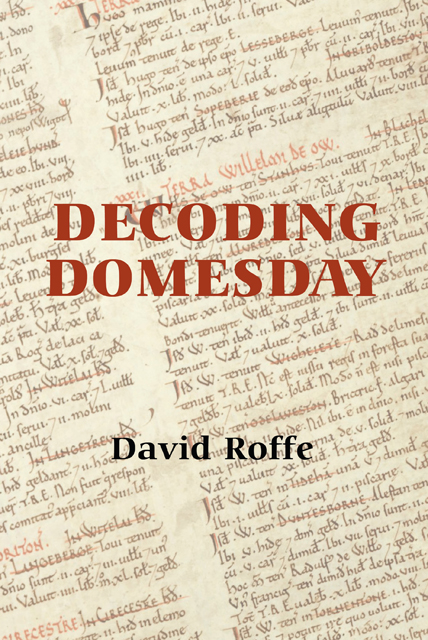Book contents
- Frontmatter
- Contents
- Tables
- Dedication
- Preface
- Acknowledgements
- Abbreviations
- 1 Domesday Past and Present
- 2 The Domesday Texts
- 3 The Inquest and the Book
- 4 The Domesday Boroughs
- 5 Lordship, Land, and Service
- 6 The Vill and Taxation
- 7 The Economy and Society
- 8 The Communities of the Shire
- 9 The Beyond of Domesday
- 10 Domesday Now
- Appendix The main entry forms of GDB
- Bibliography
- Index
6 - The Vill and Taxation
Published online by Cambridge University Press: 10 March 2023
- Frontmatter
- Contents
- Tables
- Dedication
- Preface
- Acknowledgements
- Abbreviations
- 1 Domesday Past and Present
- 2 The Domesday Texts
- 3 The Inquest and the Book
- 4 The Domesday Boroughs
- 5 Lordship, Land, and Service
- 6 The Vill and Taxation
- 7 The Economy and Society
- 8 The Communities of the Shire
- 9 The Beyond of Domesday
- 10 Domesday Now
- Appendix The main entry forms of GDB
- Bibliography
- Index
Summary
Whilepersonal service as an attribute of land tenure is no longer perceived as an exclusively Norman phenomenon, it is generally still seen as the antithesis of taxation. Gentlemen fought for their lords, while peasants paid their taxes. This dichotomy is again artificial. Tax and service were closely inter-linked exactions. At first sight this may surprise. It is clear from the records of the geld inquest in the South West that the demesne of GDB held by tenants-in-chief (but not their tenants) did not pay geld. In hundred after hundred the non-gelding land can be equated with the land in dominio in Exon and GDB. That this was the norm in the reign of William the Conqueror is illustrated by the pre-Domesday Northamptonshire Geld Roll in which substantial amounts of land in the lord's hands did not pay. There is no doubt that the demesne was exempt before the Domesday inquest.
However, this is to say less than it seems. Exemption was not inherent in the idea of (Domesday) demesne. Both Exon and the Northamptonshire Geld Roll indicate that the exempt demesne was hidated. Unlike, say, royal lands that rendered the farm of one night, it had been assessed to the geld. It was, in the language of English estate surveys and lawcodes, warland, that is land that was liable to all the king's taxes. Land liable to service was assessed even if geld was not paid on it. We can take the argument little further from the Domesday texts, but the relation of service to geld is explicit in clause eleven of Henry I's coronation charter.
I grant by my own gift that the demesne ploughs of those knights who hold by knight service should be free from all gelds, so that, being relieved of such a great burden, they may furnish themselves so well with horses and armsthat they may be properly equipped and prepared to discharge my service and to defend my kingdom.
- Type
- Chapter
- Information
- Decoding Domesday , pp. 183 - 209Publisher: Boydell & BrewerPrint publication year: 2015



